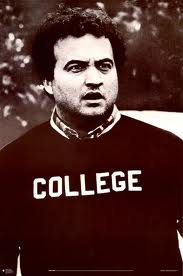Calling The Higher Education Bubble
How Cheap Student Loan Dollars Might Usher In a Wave of New Entrepreneurs

|
BY JOE PROCOPIO •
@jproco •
7.2.12
| |||||||||||||||||
Filed Under: NEWS: Startups
 On Friday, Congress passed a measure keeping alive a program that temporary halves interest rates on federal student loans to 3.4% for another twelve months. Awesome news for rising college seniors everywhere, a big fat shrug for rising juniors. But when you look at a little more data, you uncover a startling phenomenon -- in the five years that this temporary measure has kept rates low, tuition has skyrocketed.
On Friday, Congress passed a measure keeping alive a program that temporary halves interest rates on federal student loans to 3.4% for another twelve months. Awesome news for rising college seniors everywhere, a big fat shrug for rising juniors. But when you look at a little more data, you uncover a startling phenomenon -- in the five years that this temporary measure has kept rates low, tuition has skyrocketed.Average annual tuition at public, four-year institutions grew by 28 percent over the last five years, after adjusting for inflation, according to the College Board. Private institutions are generally keeping pace.
Yeah, college is expensive. We've all heard stories about kids coming out of school jobless or underemployed and that we've amassed a total student loan burden topping a trillion.
$1,000,000,000,000.00
But if you understand economics, you know that this is not a coincidence. Make money cheap, costs go up. The troubling issue is -- it seems more and more often that the piece of paper said kids are walking out with is increasingly worth less.
We're past the point of requiring a college degree for most technical positions. Further, the liberal arts, long having been a bastion of underwater basket weavery, have been joined in recent years by law and natural sciences as pursuits where an expensive degree is met with a lifelong struggle of tough job prospects and long loan payback periods for those not in the upper echelon of the grading curve.
At an impromptu lunch after the Triangle Startup Factory pitch day last month, an attorney friend of mine joked about the rash of law school graduates suing universities when they can't find a job after graduation. The universities have no one to blame but themselves, having given these kids the tools they need to pursue and probably win the lawsuits.
It's not as bad as all that, but nothing is stopping the momentum, as underscored by this very temporary extension of cheap education money. Good thing we don't have any recent examples of cheap and easy loans flooding a market into collapse.
The question has just started to be asked by the current generation of college-age, and thus entrepreneur-age, kids: Is a four-year college education really worth the time and money when that time and money could be spent starting a business?
I say, barring an Ivy League liberal arts degree that isn't completely scholarshiped, yes, stay in school kids, get your BS.
Robbie Allen, the robot to my human at Automated Insights (as well as the CEO), has a daughter the same age as my kids. He, like me, is considering a choice in ten years. He'll either get her through a full four-year university education or provide the funding for her first startup.
So the more important question is that of ten years, or five years, or considering the possibility of interest rates doubling again, next year. But I like to frame that question this way:
At what point does entrepreneurism replace post-secondary education as the new normal?
Companies We Mentioned In This Post
|
|
You Might Also Be Interested In
 A Rant Against Bad Startup Advice
A Rant Against Bad Startup AdviceEvery so often, I find myself at odds with a particular bit of conventional startup advice.
The Open Interconnect Consortium, a group of big tech companies including Intel, Samsung, and Dell, announced this week their intention to create and open-source a specification for connecting the billions of things that make up the Internet of Things.
 Time To Shelve the Turing Test
Time To Shelve the Turing TestSo the Internet collectively lost its mind last week on the story that machines had finally caught up to us cagey humans, and that a supercomputer called Eugene Goostman effectively passed the age-old Turing Test
 It's Tough To Be an Angel (Investor)
It's Tough To Be an Angel (Investor)A very odd thing happened at the ExitEvent Startup Social this past Monday night at Boylan Bridge Brewpub in downtown Raleigh.
 Why (Good) Journalists Have Nothing to Fear from Automated Content
Why (Good) Journalists Have Nothing to Fear from Automated ContentOn Friday, May 30th, I'll be speaking at the Tow Center for Digital Journalism at Columbia University at the Quantifying Journalism: Metrics, Data and Computation Conference. I'll be talking about the Robot Reporter trend.